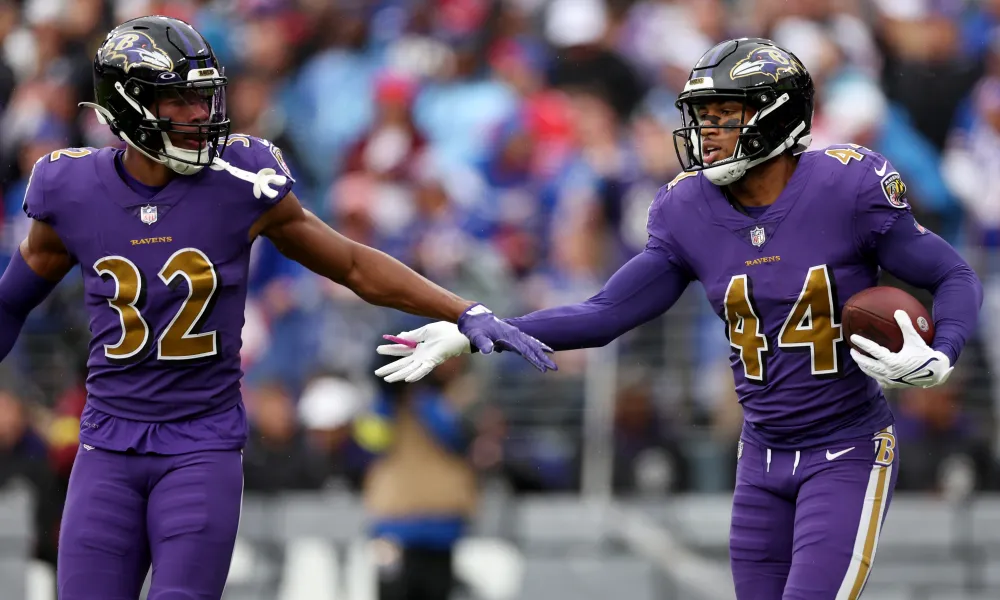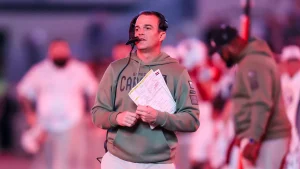
Josh Allen, according to one NFL Hall of Famer, won NFL MVP for the “wrong reason.”
1. Josh Allen’s Rise to Prominence
Josh Allen’s journey to becoming an MVP contender has been anything but conventional. After a standout career at Wyoming, Allen was drafted by the Buffalo Bills in the first round of the 2018 NFL Draft. His early career in the NFL was marked by inconsistency, with significant struggles in accuracy. However, Allen’s physical tools—his cannon arm, mobility, and size—were undeniable, giving him immense potential.
In his first few seasons, Allen had moments of brilliance but also faced questions about his accuracy and decision-making. But something clicked in his third year, especially when the Bills hired offensive coordinator Brian Daboll in 2018. Under Daboll’s tutelage, Allen’s game matured. His mechanics improved, and he became far more accurate, transforming from a raw, athletic quarterback into a polished and efficient passer.
By the 2020 season, Allen was firmly in the conversation for league MVP. He led the Bills to an impressive 13-3 record, with a dynamic offensive attack. Allen posted career-high numbers across the board, throwing for over 4,500 yards, 37 touchdowns, and just 10 interceptions. His passer rating, a key metric of efficiency, was a career-best 107.2. Additionally, Allen’s ability to make plays with his legs—scoring 8 rushing touchdowns—added to his dual-threat appeal.
This season elevated Allen to the elite tier of NFL quarterbacks, and his name was being consistently mentioned alongside other MVP candidates like Patrick Mahomes and Aaron Rodgers.
2. Hall of Famer’s Perspective
Now, the crux of the Hall of Famer’s claim that Allen won for the “wrong reason” is intriguing. The NFL MVP award, especially in recent years, has been seen as a reflection of a player’s overall impact on their team and the game, often favoring quarterbacks who can not only accumulate impressive statistics but also perform in critical moments.
It’s possible that the Hall of Famer, having a more traditional or old-school perspective on the MVP award, sees Josh Allen’s MVP candidacy as being driven more by his “highlight reel” moments than by sustained excellence. Allen’s strong arm, flashy plays, and ability to throw deep passes with pinpoint accuracy have become some of his signature traits. While these qualities are certainly impressive, there’s an argument to be made that the MVP should go to a player who combines that flash with a more consistent, sustained level of play.
Additionally, the Hall of Famer might argue that Allen’s MVP push was driven by his connection with a high-powered offense, fueled by playmakers like Stefon Diggs, and by a passing-heavy system that inflated his numbers. In other words, the MVP win might not be due solely to Allen’s individual brilliance but also due to the system that allowed him to excel. Some may believe that if Allen had been placed in a more traditional or less offensive-minded system, his numbers might not have been as impressive.
3. MVP Criteria and Debates
The NFL MVP award has evolved over the years, with varying criteria used to determine the winner. In the early years, the MVP award often went to the player who was seen as the most valuable to his team, often reflecting a combination of statistics and leadership. However, in modern times, the MVP race has become more about raw statistics—specifically for quarterbacks.
In the past, MVP winners like Barry Sanders (1997) or LaDainian Tomlinson (2006) demonstrated that running backs could still take home the honor, even in a quarterback-dominated league. In recent years, however, the MVP has been almost exclusively a quarterback award, as the game has become more pass-heavy and quarterbacks are the focal point of nearly every offense.
Thus, with the NFL’s increasing emphasis on passing and scoring, Allen’s candidacy makes sense. His arm strength, ability to push the ball down the field, and efficient playmaking have placed him at the forefront of the MVP conversation. But this evolution also means that some Hall of Famers and old-school thinkers may believe that the award should go to a player who drives success through more traditional means—like leadership, poise under pressure, or a more balanced approach to offense.
4. Supporting Factors for Allen’s MVP Candidacy
Despite the criticisms, there are clear reasons why Josh Allen was considered a worthy MVP candidate. His stats in the 2020 season were remarkable. He finished 2nd in the league for passing touchdowns (37) and 5th in passing yards (4,544), while also being one of the top performers in passer rating.
Beyond the numbers, Allen’s leadership was evident in his ability to elevate his teammates. The Bills offense was highly efficient, and Allen showed significant growth as both a passer and a leader. His poise in high-pressure situations, particularly in crucial games, helped the Bills secure a spot atop the AFC East for the first time in over 20 years.
In addition, Allen’s ability to impact the game with his legs further solidified his candidacy. He was a true dual-threat, accounting for 8 rushing touchdowns and adding another layer to his game that made him particularly dangerous in both short-yardage and red-zone situations. In short, Allen was not just a statistician—he was a playmaker who influenced every aspect of Buffalo’s offense.
5. Counter-Arguments and Criticism
Despite the accolades, Allen’s MVP candidacy wasn’t without criticism. One major critique was that while Allen was incredibly productive, he benefited from a system designed to maximize his strengths. Brian Daboll’s offensive scheme was tailored to Josh Allen’s skill set, allowing him to thrive in a pass-heavy, vertical offense. Some critics argue that Allen’s numbers might have been inflated in a system built around maximizing explosive plays, making the MVP award less about his individual talent and more about the scheme that facilitated his success.
Another point of contention is Allen’s inconsistency in earlier seasons. While he showed massive improvement in 2020, his early years were marked by a lack of accuracy and inconsistency in his decision-making. Some critics argue that other quarterbacks, like Aaron Rodgers or Patrick Mahomes, had more sustained excellence over several seasons, making them more deserving of the MVP title.
Furthermore, while Allen’s statistics were impressive, some detractors believe that other players had just as much of an impact on their team’s success. Players like Derrick Henry, who dominated as a running back, or Aaron Donald, who terrorized opposing quarterbacks on defense, were seen by some as MVP-worthy but ultimately overlooked in favor of Allen.
In conclusion, the statement by the Hall of Famer that Josh Allen won the NFL MVP for the “wrong reason” reflects a broader debate about what the MVP award should truly represent. Should it be about raw statistics, the player’s talent, and explosive moments? Or should it consider sustained excellence, leadership, and a more traditional, balanced approach to the game?
While Allen’s MVP candidacy was certainly strong, it’s fair to acknowledge that there are valid criticisms regarding how the award is handed out in today’s NFL. His success may have been aided by a system tailored to his strengths, and his rise to prominence in such a short time leaves some questioning whether he won for the right reasons.
Ultimately, this debate highlights the evolving nature of the NFL and the MVP race itself. As the game continues to change and evolve, so too will the way we assess a player’s worth and impact. And while Josh Allen’s MVP season was undoubtedly impressive, it also sparked meaningful conversations about what it truly means to be the most valuable player in the NFL.





